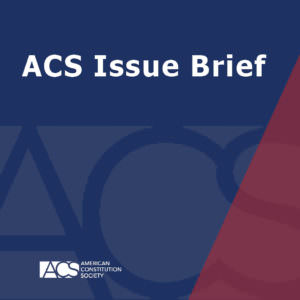The Case for Replacing Article II Treaties with Ex Post Congressional-Executive Agreements
Gerard C. and Bernice Latrobe Smith Professor of International Law and Counselor to the Dean, Yale Law School
 ACS is pleased to distribute an Issue Brief by Oona Hathaway, Professor of Law, University of California, Berkeley School of Law. In this Issue Brief, entitled, "The Case for Replacing Article II Treaties With Ex Post Congressional-Executive Agreements".Professor Hathaway argues that nearly every international agreement can and should be concluded through a congressional-executive agreement instead of under the Treaty Clause in Article II of the Constitution. She explains that the process for making binding international agreements in the United States today proceeds along two separate, parallel tracks. The Treaty Clause route, which is better known and is principally used to conclude agreements on human rights, taxation, environment, arms control, and extradition, requires a two-thirds vote in the Senate and bypasses the House of Representatives. An increasingly common alternative, the congressional-executive agreement, is often used for free trade agreements and is accomplished through the enactment of ordinary legislation passed by both houses of Congress and signed into law by the President.
ACS is pleased to distribute an Issue Brief by Oona Hathaway, Professor of Law, University of California, Berkeley School of Law. In this Issue Brief, entitled, "The Case for Replacing Article II Treaties With Ex Post Congressional-Executive Agreements".Professor Hathaway argues that nearly every international agreement can and should be concluded through a congressional-executive agreement instead of under the Treaty Clause in Article II of the Constitution. She explains that the process for making binding international agreements in the United States today proceeds along two separate, parallel tracks. The Treaty Clause route, which is better known and is principally used to conclude agreements on human rights, taxation, environment, arms control, and extradition, requires a two-thirds vote in the Senate and bypasses the House of Representatives. An increasingly common alternative, the congressional-executive agreement, is often used for free trade agreements and is accomplished through the enactment of ordinary legislation passed by both houses of Congress and signed into law by the President.
Read the full Issue Brief here: Hathaway_Issue_Brief
